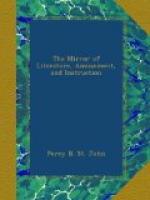We must now allude to an event in Campbell’s life, which will ensure him the gratitude of ages to come: we mean as the originator of the London University. Four years before it was made public, the idea occurred to him, from his habit of visiting the Universities of Germany, and studying their regulations. He communicated it at first to two or three friends, until his ideas upon the subject became matured, when they were made public, and a meeting upon the business convened in London, which Mr. Campbell addressed, and where the establishment of such an institution met the most zealous support. Once in operation, several public men of high talent, headed by Mr. Brougham, lost not a moment in forwarding the great and useful object in view. The undertaking was divided into shares, which were rapidly taken; but Mr. Campbell left the active arrangements to others, and contented himself with attending the committees. With unexampled rapidity the London University has been completed, or nearly so, and Campbell has had the satisfaction of seeing his projected instrument of education almost in full operation in less than three years after he made the scheme public. Although one of the most important,[4] this is not the only public-spirited event of this description, in Mr. Campbell’s life; for he was instrumental in the establishment of the Western Literary Institution, in Leicester Square; and at the present time he is, we believe, in conjunction with other eminent literary men, organizing a club to be entitled the Literary Union, whose lists already contain upwards of 300 men of talent, including Sir Walter Scott and all the principal periodical writers of the day.
[4] Still, Mr. Campbell’s
name does not occur in the List of Council
or
Professors of the University, in the British Almanac
for the
present
year.
Campbell, as has already been observed, was educated at Glasgow, and received the honour of election as Lord Rector, three successive years, notwithstanding the opposition of the professors, and the excellent individuals who were placed against him; among whom were the late minister Canning, and Sir Walter Scott. The students of Glasgow College considered that the celebrity of the poet, his liberal principles, his being a fellow-townsman, and his attention to their interests, entitled him to the preference.
In person, Mr. Campbell is below the middle stature, well made, but slender. His features indicate great sensibility; his eyes are particularly striking, and of a deep blue colour; his nose aquiline; his expression generally saturnine. His step is light, but firm; and he appears to possess much more energy of constitution than men of fifty-two who have been studious in their habits, exhibit in general. His time for study is mostly during the stillness of night, when he can be wholly abstracted from external objects. He is remarkable for absence of mind; is charitable and kind in his disposition, but of quick temper. His amusements are few; the friend and conversation only; and in the “flow of soul” there are few men possessing more companionable qualities. His heart is perhaps one of the best that beats in a human bosom: “it is,” observes a biographer, “that which should belong to the poet of Gertrude, his favourite personification.”




